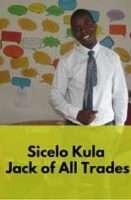Being surrounded by loving people – from parents, family members, educators and friends – has helped the talented, top music producer Wanga “Best Pro” Mukwevho to embrace the positive side of life and see the purpose of his existence in this world.
From what his late, lovely mother Sankie Raphasha had told him, Wanga was welcomed into this world a healthy, chubby bundle of joy on 27 August 1988. However, at the age of two, he caught measles and, before the family could realise it, the sickness had affected and totally impaired his eyesight.
“Unlike other children who opened their eyes and saw their parents, aunts and cousins, I learned to ‘see’ all loved ones and friends with my ears. People have distinct voices and different footsteps or manners of walking. Even from a younger age, I didn’t have to ask who was getting inside or going outside the house.”
Residing at Makonde village in the Thulamela area, Limpopo, Wanga has had an aptitude for music from an early age.
“I learned to sing because my mother used to sing when she did her household chores – such as washing dishes, cooking, or washing clothes.”
Today he has grown from singing in the streets to a professional, freelance producer and composer. So far, he has produced excellent gospel singers such as award-winning Lufuno Dagada, Ndivhaleni Musetha, Lucky Mdhluli, Shakes Mbedzi and PGC Worship Team.
But Wanga’s journey started in the special schools which he attended. At around four years of age, his mother left him in the care of his paternal grandmother, Vho Munzhedzi Mukwevho, while she was busy fending for him through odd jobs.
“My granny doted on me and gave me that sort of special treatment. She gave me the kind of care that made me feel like a baby prince. She had become my mother in the process.”
At the age of five Wanga was accepted at Tshilidzini Special School to begin his pre-school, and he was to continue through junior and primary levels in the same institution. It was altogether a new environment for him. He had grown within the comfort zone of his home, where he had been pampered with tenderness and special treatment.
“Then I had been flung into the open world where there were a lot of other children with special needs like myself. No special treatment from granny. And I didn’t know other children at the school; it made me feel lonely most of the time. I was not ready to be away from my granny, and my mother who regularly returned home to check on us.”
He said that he had a feeling of alienation about being at the special school.
“The special school had nothing to do with that feeling, though. They just treated me like any other kid and it felt alienating. I was used to sitting on my granny’s lap, leaning on her breasts and falling asleep. Now the school moment had killed that comfort zone.”
However, his sweet voice, as he sang strolling in the school, drew the attention of one educator, Merriam Nethonzhe.
“She said I had an angelic voice which connected those who heard me sing to God. She encouraged me to join the school choir, and I was one of the lead vocalists in some songs. But my singing didn’t start at school. I remember that people, young and old, used to stop me and ask me to sing them a song or two. And they would clap hands and comment that I was a good singer.”
At Tshilidzini, he had acquired the ability to read and write in Braille and had also excelled in speed typing using a visual computer system.
In 2002, Wanga moved from Venda to do his secondary school at a special school in Soshanguve in Pretoria, Filadelfia Secondary School.
“I also joined the school’s choir but I was among the few small boys and I remember someone discouraging me from singing in the choir. They said I was just a small boy.”
In 2003, when he was at school, he received the bad news about his mother’s passing away after a short illness.
“I felt shattered because I knew nobody else could love me like my mother. Even though she was away most times, whenever she had come home, she spent quality time with me. She remains the woman who made me feel that even though I had a disability I was still a human. She knew how to motivate me into turning my weaker points into bricks of strength and success.”
His father Elvis Mukwevho, a lawyer who had studied in the US, Turkey and Colombia, returned from overseas and set up an associate in Gauteng. Around 2004, he got very close to his son, Wanga.
“My mother was no more, so I needed my dad all the more. He asked me what I wanted to do and I said to study law. He told me to follow my heart. He pointed out that he could see that I had an aptitude in music. He said he would give me all his support and that I should consider studying music. He promised to set up a recording studio for me.”
But his father passed on in 2005. “I thought my world had come to an end. Here was the man who bought me my first keyboard, and encouraged me to pursue my first love – music, and he was no more.”
After all the tragic experiences of losing both parents, Wanga knew that he had to lead a responsible, honourable life of establishing himself in the arts in order to honour the memories of his late parents.
“They loved my singing – and they wanted to see me up there in the music industry. I take solace in that they showered me with love and care.”
Wanga completed his Grade 12 in 2006 and registered for a BA in International Relations at Unisa, but he still felt so strongly about music. He felt that he had chosen the wrong field of study, so he came back home.
The leadership of the multi-award winning gospel group, Worship House Team, found out that he was home and requested him to join them. Wanga declined, but they kept at him until he relented.
“I played for both team A and B of the Worship House. I travelled extensively with the group.”
Some singers within the Worship House Team noticed Wanga’s skills and abilities of a producer, arranger and composer and then requested him to work with them in their respective solo projects.
After a decade as a producer, he released his debut full-length gospel album entitled The Glory has Come, which comprises at least ten songs.
“All I want is for my music to speak to people. My purpose here on earth is to live a happier life and touch other lives through my art.”
“People who still discriminate against the disabled don’t have proper thinking capacities. We are all disabled in one way or another. However, all I can say now is to advise other disabled people to work harder, follow their dreams and refuse to be beggars.”
***
What are some of the lessons did you take it out from Wanga’s inspiring story?






